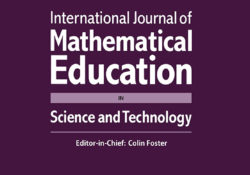tandfonline.com har udgivet en rapport under søgningen „Teacher Education Mathematics‟: Abstract Formulae display:?Mathematical formulae have been encoded as MathML and are displayed in this HTML version using MathJax in order to improve their display. Uncheck the box to turn MathJax off. This feature requires Javascript. Click on a formula to zoom. This paper presents a case study of two sixth-grade students’ use of an iPad as an instructional tool for mathematics. Based on their written and oral responses, we investigated and analyzed their meaning making process with mathematical content in a classroom where the iPad was a central tool for teaching practices. The analyses were based on Steinbring’s [(2005). The construction of new mathematical knowledge in classroom interaction: An epistemological perspective (Vol. 38). Springer] framework, which we applied to understand… Continue Reading →
Like this:
Like Loading...
tandfonline.com har udgivet en rapport under søgningen „Teacher Education Mathematics‟: ABSTRACT ABSTRACT To date, few data on how the COVID-19 pandemic and restrictions affected children’s physical activity in Europe have been published. This study examined the prevalence and correlates of physical activity and screen time from a large sample of European children during the COVID-19 pandemic to inform strategies and provide adequate mitigation measures. An online survey was conducted using convenience sampling from 15 May to 22 June, 2020. Parents were eligible if they resided in one of the survey countries and their children aged 6–18 years. 8395 children were included (median age [IQR], 13 [10–15] years; 47% boys; 57.6% urban residents; 15.5% in self-isolation). Approximately two-thirds followed structured routines (66.4% [95%CI, 65.4–67.4]), and more than half were active during… Continue Reading →
Like this:
Like Loading...

tandfonline.com har udgivet en rapport under søgningen „Teacher Education Mathematics‟: ABSTRACT ABSTRACT Research on the screen time of young children and its relationship to their cognitive and social development is controversial. Based on a stratified, random sample of 579 five-year-old children in Guangdong, China, this study explores the relationship between the screen time of Chinese children and their cognitive and social development. Specifically, we assessed children’s receptive vocabulary, math skills, executive functioning, science knowledge, and social skills in relationship to their active and passive screen times. Results indicate that the passive screen time of Chinese preschool children was negatively associated with their mathematics achievement, science performance, executive functioning, and social skills. Active screen time was positively associated with their receptive language skills and science knowledge. Additionally, the screen time of… Continue Reading →
Like this:
Like Loading...


